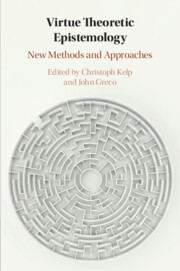Book contents
- Virtue Theoretic Epistemology
- Virtue Theoretic Epistemology
- Copyright page
- Contents
- Figures
- Contributors
- Acknowledgements
- Introduction
- Chapter 1 Closed-Mindedness As an Intellectual Vice
- Chapter 2 Epistemic Virtues and Virtues with Epistemic Content
- Chapter 3 Difficulty and Knowledge
- Chapter 4 What Is Epistemic Entitlement?
- Chapter 5 Knowledge-Producing Abilities
- Chapter 6 Virtue Epistemology, Two Kinds of Internalism, and the Intelligibility Problem
- Chapter 7 Knowledge Is Extrinsically Apt Belief
- Chapter 8 Explaining Knowledge
- Chapter 9 Anti-risk Virtue Epistemology
- Chapter 10 Responsibilism within Reason
- Index
- References
Chapter 4 - What Is Epistemic Entitlement?
Reliable Competence, Reasons, Inference, Access
Published online by Cambridge University Press: 16 July 2020
- Virtue Theoretic Epistemology
- Virtue Theoretic Epistemology
- Copyright page
- Contents
- Figures
- Contributors
- Acknowledgements
- Introduction
- Chapter 1 Closed-Mindedness As an Intellectual Vice
- Chapter 2 Epistemic Virtues and Virtues with Epistemic Content
- Chapter 3 Difficulty and Knowledge
- Chapter 4 What Is Epistemic Entitlement?
- Chapter 5 Knowledge-Producing Abilities
- Chapter 6 Virtue Epistemology, Two Kinds of Internalism, and the Intelligibility Problem
- Chapter 7 Knowledge Is Extrinsically Apt Belief
- Chapter 8 Explaining Knowledge
- Chapter 9 Anti-risk Virtue Epistemology
- Chapter 10 Responsibilism within Reason
- Index
- References
Summary
Tyler Burge first introduced his distinction between epistemic entitlement and epistemic justification in ‘Content Preservation’ in 1993. He has since deployed the distinction in over twenty papers, changing his formulation around 2011. His distinction and its basis, however, is not well understood in the literature. This chapter distinguishes two uses of ‘entitlement’ in Burge and then focuses on the contrast between justification and entitlement, two forms of warrant, where warrants consists in the exercise of a reliable belief-forming competence. Since he draws the distinction in terms of reasons, this chapter brings his account of reasons altogether in one place. The chapter introduces a decision-procedure for classifying warrants as justifications or entitlements. The distinction is not the same as the inferential vs. non-inferential distinction. Inference is distinguished from processing, thinking, reasoning, and critically reasoning. Burge’s new formulation of the distinction was driven by the recognition of non-accessible modular reasons. Three kinds of access are distinguished.
Keywords
- Type
- Chapter
- Information
- Virtue Theoretic EpistemologyNew Methods and Approaches, pp. 93 - 123Publisher: Cambridge University PressPrint publication year: 2020
References
- 5
- Cited by

